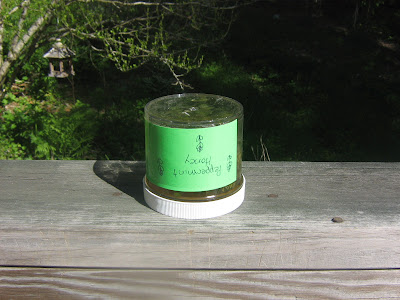 I wish this were a poetic metaphor for something sensual and romantic.
I wish this were a poetic metaphor for something sensual and romantic.But I mean it quite literally. If you are going to make an herbal honey from fresh herbs, aside from making certain you are using top quality honey, you have to turn it. Otherwise, it can ferment if the herbs had too much water content. Letting your fresh plant material wilt for a day is o.k. too, if you want, but I really like mine super fresh, (as in: roses! and bee balm, and mint and .....) and if harvested on a dry sunny day, it'll be great. Turning your honey keeps the plant covered in the honey (it likes to float) and helps release the yumminess. It only takes a week - we're working with volatile oils here which are readily released from the plant -then you can strain it or just eat it up. A warm sunning before straining is just right for getting it to sift through the mesh.
I don't refrigerate my finished herbal honey, but you can if you are concerned. Elixirs are great - but sometimes you just want it without the added zing of the alcohol.
See, herbal honies were originally used to preserve precious dried herbs, to administer as a paste - not necessarily to extract the plant constituents. In India where it is very hot, dried plants go moldy easily and they need to utilize their array of clever preservation methods not just for food but for medicine. Herbal honey pastes are a mainstay, demonstrated easily by the wide use of Chyawanprash. And GOOD honey is essential, as we found out when King Tut's tomb revealed honey that was still in edible condition, and in addition the Egyptians used it along with resins to embalm the bodies laid to rest. Good honey lasts a very, very long time. It's no wonder it used to be used as money. I'd accept honey as payment, wouldn't you?
Hit up your local farm market or buy a local honey and call the phone number on the label to see if you can get it direct - and while you're at it ask for beeswax and propolis! With our bee crisis it's ever more vital that we support our local beekeepers.
If you're really jazzed, get a hive and become a backyard beekeeper.
Back to plants - aromatic herbs with low water content are ideal .... Rosemary, sage, Lavender. They are low maintenance and incredibly useful and tasty.
Dried herbs mixed into honey make the options truly endless .... turmeric for deep coughs, ginger for long car rides, ashwagandha for all-nighters, rose for daily anti-pitta teas. Basil and oregano for cooking. Cardamom for everything. And on and on.
3 comments:
Wonderful! Thank you for sharing those ideas. I am so concerned about the bee crisis, and I wonder how to help. I will visit my local farmer's market for local honey this week.
I know - it's a scary thing. Now when I buy local honey I feel like really what I am doing is making an investment.
Ooohhh, great post. I got paid in honey last week! It was great. :) thanks for posting.
Post a Comment